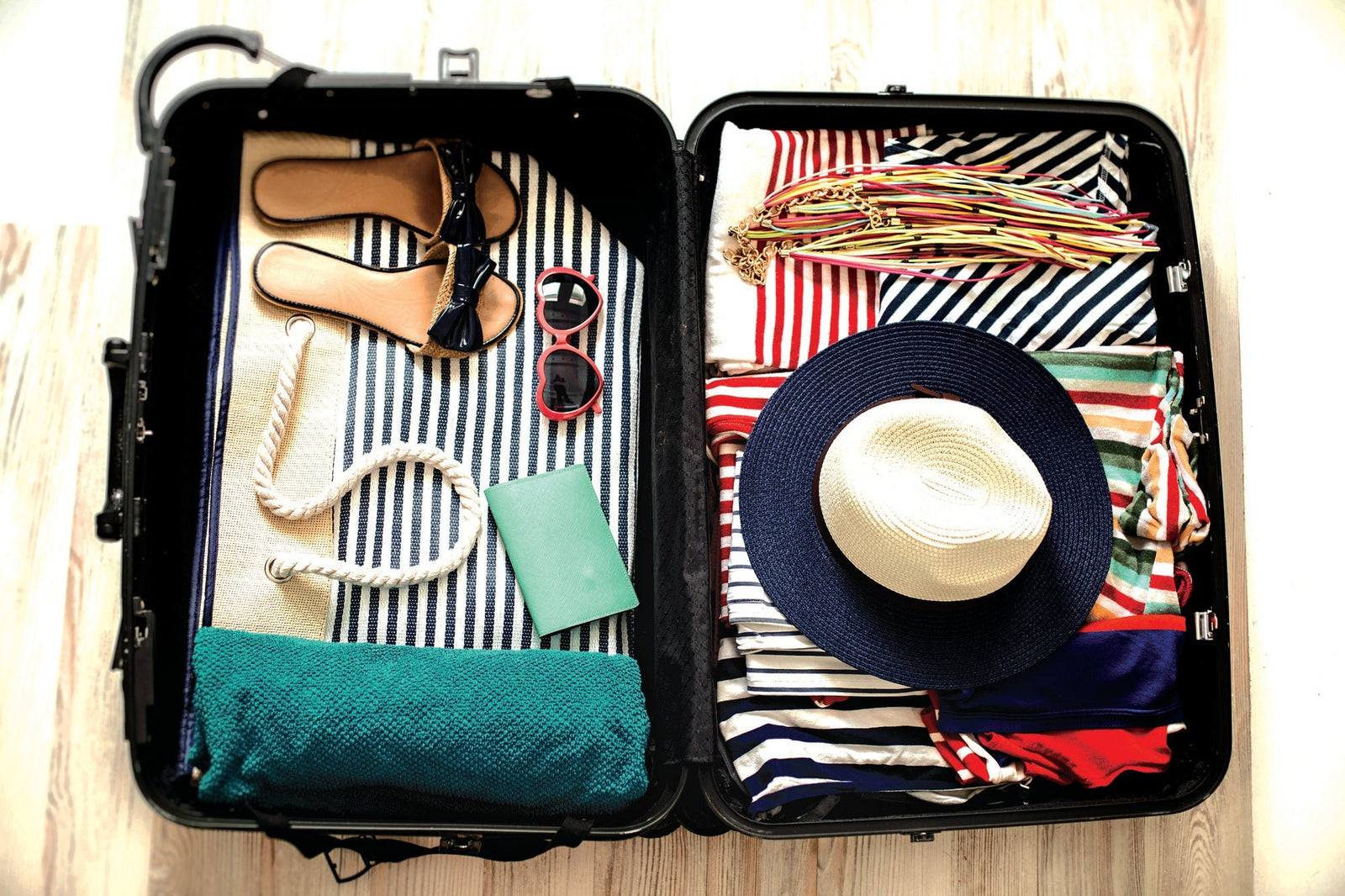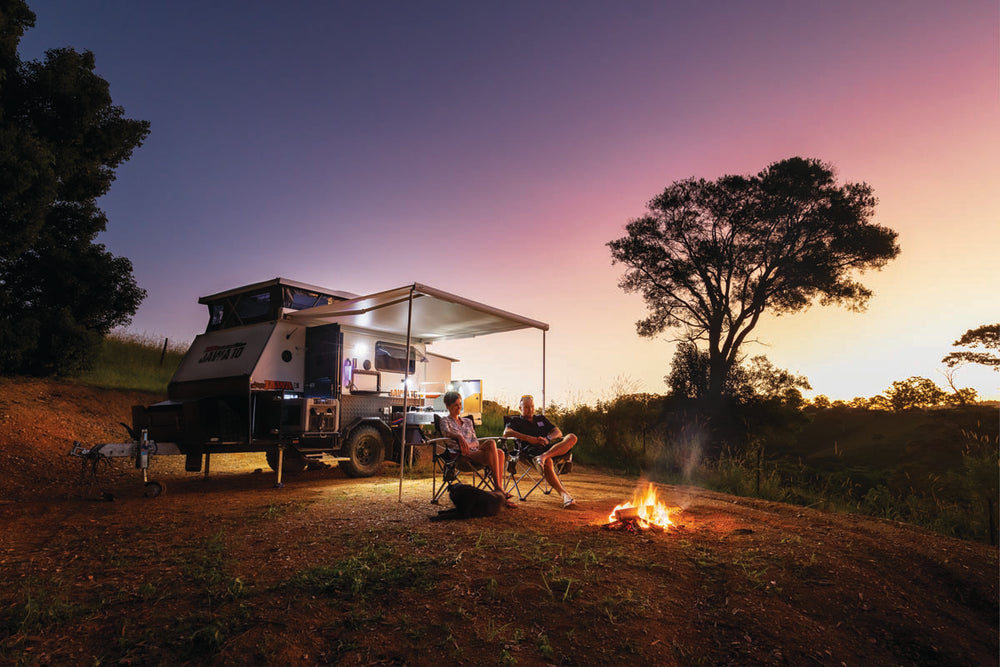Life Hacks on the Road

Whether it's in a free camp or caravan park, most nomads love a chat and to share their stories. It doesn't matter where you come from or what you do (or did) for a living or how much you earn, there is always room for a connection and the exchange of invaluable information that makes life on the road that much easier. Here are some hot tips we gathered while on a half lap of Australia in our motorhome.
1. THINK MINIMALISM
Don’t take too much with you, and remember weight restrictions if you're towing a caravan.
2. PACKING LIGHT
Avoid stuffing the suitcase. Remember the 3:1 tops-to-bottoms ratio. Pack hot and cold weather clothes separately. They can be stored away when not needed. Pack clothes in reusable shopping bags — they fit perfectly into most caravan and motorhome cupboards and are easy to pull in and out.
3. IF YOU DON’T USE IT, LOSE IT
Place a coloured sticker on all those things you packed because you knew they would “come in handy”. As you use them, remove the sticker. If, after three months, the sticker is still there, leave this item home on your next trip.
4. TO-DO LIST
Have a checklist for the necessary tasks to do before you take off, such as closing all the windows and skylights, putting the antenna down, locking doors, drawers and the fridge, and detaching from power and water — don’t laugh, I’ve seen people drive off while still hooked up!
5. OFF TO THE SHOW
The showgrounds can often offer a cheap place to stay — sometimes with power.
6. ONLY TAKE THINGS WITH TWO USES
You’ll see lots of examples in these tips —microfibre cloths, buckets, paper towels, Chux wipes, sarongs, takeaway containers, cordial bottles, shopping bags, and doggy doo bags.
7. CLEAN CLOTHES
For washing clothes, grab a big bucket with a lid. Add water, wool wash and dirty clothes then put on the lid and drive. Agitation while driving washes clothes and because you’ve used wool wash, you don’t need to rinse.
8. RECYCLE CONTAINERS
Takeaway containers fit perfectly in the tiny on-board fridges and the lids help keep them in place when stacking.
9. TRASH and TREASURE
Op shops are perfect for when you break or lose something and need to replace it — think saucepans, casserole dishes, coffee cups and even champagne glasses!
10. RUB-A-DUB DUB
For those with on-board showers, stand in one of those big flexible buckets (available from stores such as Kmart and hardware shops). Save the water in the bucket to wash your feet later. Or, add dirty clothes to stand on and stomp while washing yourself, killing two dirty birds with one wash.
11. TEA TIME PREP
Boil water once in the morning and store in a thermos for use during the day. It saves gas and makes morning tea and lunch stops even easier.
12. ICE MAGIC
We found 2L cordial or milk containers full of ice make great blocks for the bottom of the Esky and save on the amount of ice you need to buy from shops.
13. REDUCE AND RE-USE
Insulated shopping bags make the best toiletries bags. They are waterproof, so can stand on the ground, and are large enough to carry your toiletries, clean underwear and a towel. They also make great beach bags.
14. POSH FEET
Bath mats are a little bit of luxury, and are so good when you get out of the shower and don’t want to try the balancing act on your thongs. Buy cheap and small ones from IKEA, $2 shops or op shops. Microfibre cloths double as great mats and are easy to wash.
15. FUEL FOR THOUGHT
Always have a jerry can of spare fuel.
16. REFUELLING
Always top up wherever you can. Don’t wait until the tank is almost empty or you may get caught short in the middle of nowhere.
17. VACUUM SEAL MEAT
This will keep your meat/fish/veggies fresh for up to five times longer than when it’s not vacuum-sealed. You can buy your own machine for about $130 from places such as Target. It’s really handy if you like (and catch) fish. Lots of butchers will also vacuum seal meat for a small price if you ask, and they love your business.
18. FROZEN MEALS
Freeze a few dinners in takeaway containers and use them as ice when you set out on your trip. This can also be done at each caravan park stop — take advantage of the camp kitchens.
19. LONG-LIFE MILK
Learn to love it — it doesn’t need refrigeration until it’s opened.
20. MENU PLANNING
Plan your meals and shop accordingly. Then buy a few cupboard staples including baked beans or cans of soup for when you are caught short or just decide somewhere is so nice you want to stay longer.
21. BORDER PATROL
Be aware of quarantine and food restrictions when crossing state borders to avoid having to throw out valuable food. Fresh fruit, veggies and honey will be confiscated.
22. H2O ON THE GO
Always have plenty of spare water. We take 4x10L plastic containers and replace or refill them as we use them.
23. FLY NETS
Worth their weight (and more) in gold — especially if you’re heading to the outback. The further inland you go, the more expensive they get. Not only do they keep the pesky flies at bay, the nets also act as a sunshade for your face.
24. SHED SOME LIGHT
Everyone has their own special torch. Some like a tiny torch attached to their keys, or one with a magnet.
I like my head torch with rechargeable batteries. It’s on your head so you don’t have to hold it and, apart from looking a bit geeky, comes in handy for midnight walks to the loo or nights out fishing on the jetty.
25. ZIP IT
Zip lock bags have so many uses — they save space in fridges and cupboards for leftovers or half-used open packets of biscuits (that never happens with me).
They offer a waterproof container when carrying bits and pieces — even mobile phones — in backpacks next to water bottles. They can also be washed out and re-used again. They may also be used for smelly bait or fishing rigs, weights etc if you don’t want to carry a tackle box.
26. PAPER TOWELS
Another best friend on the road are paper towels. Water saver to wipe plates instead of rinsing them … or to wipe off most dirt before a wash. They can be used to dry dishes as well, or wipe up spills. Then use them as a fire starter.
27. WIPING SPILLS
Some people don’t like using paper and choose Chux wipes instead. They do the same trick but you can wash and reuse them.
28. WET WIPES
Heard of a 'pommy bath'? Wet wipes are brilliant when you have no, or limited water. Start with your face and work your way down! Just don’t throw them into the toilet — even if they say 'flushable' they aren't.
29. SPARE PARTS
Specs; batteries; screws; nuts; hose fittings (for when you leave yours attached to the caravan park taps).
30. GOLD COINS
Start collecting (and hiding them) for use in caravan park washing machines.
31. REPAIR KIT
Selection of glues, tapes, cable ties, ropes, sharp knife, lighter/matches, and a Leatherman or multi-tool.
32. FIRST AID KIT
Don’t leave home without basics like Band-Aids, pain killers and antihistamines to make life comfortable. Knowledge can save lives, so take a first-aid course.
33. DUCT TAPE
Great to fix leaks, cracks, broken bits and pieces, and can trip-proof many a hazard like cords running across the ground.
34. TOILET PAPER
Bulk buy and take it everywhere.
35. BOOKS
Take books, books and more books (maybe on a Kindle to save room), and puzzles, playing cards, crosswords, pens and paper.
36. WALKIE TALKIES
These have saved many a partnership on
the road. Telling the driver to go left or right and back up just a smidge more is much nicer than yelling at them and hoping they hear you. They can also help keep track of the kids.
37. HOOKS
Buy an over-the-door hook to take to the shower block — there are never enough hooks or shelves.
38. SOLAR LIGHTS
Reduce tripping hazards at night by placing some of these cheap lights around tent ropes and awning struts. Pool noodles cut in half and wrapped around ropes also stop many a hazard.
39. SNACK PACKS
Hardware stores sell screw pack containers that transform into great snack packs on the road. You’ll eat more healthy options by adding fruit or nuts and save cash as well.
40. TALCUM POWDER
Spread talcum powder around any structure that touches the ground (such as tyres or awning struts) to stop ants climbing up inside your van.
41. MIDGE BITES
There are so many tips on how to prevent and then how to deal with midge bites. Take vitamin B tablets to prevent being bitten; antihistamines can help stop itching; tea tree oil dabbed on open sores helps heal them and ease itching; dipping a teaspoon in boiling water then dabbing the bite mark gently and quickly until you can hold it down for longer, helps ease pain. Some people swear by squeezing the bite and releasing the toxins.
42. BACKPACK
Have one of these packed and ready to use with all the essentials — water, sunblock, fly nets, insect spray, bandages and hats.
43. SARONGS
Sarongs work in so many ways. Handy to wear to the beach or to the shower, extra shade hanging from awnings, handy curtain and can double as a temporary sheet.
44. PAPER PLATES
If you have to use them, they also come in handy as fire starters.
45. DOGGY POO BAGS
You can buy whole rolls of these biodegradable bags and, apart from their obvious use, they make great rubbish bags.
46. SUPPORT THE LOCALS
This can come in various forms. Buying petrol is a necessity, but maybe also hit the local bakery, buy meat from the local butcher (who may even vacuum seal it for you), and try to eat out one night at the local pub or cafe if your budget allows.
47. SECURITY
Never leave your vehicle unlocked — even if you’re just ducking to the loo. Don’t tempt thieves by leaving valuables in sight. Don’t leave anything of value near the door — it’s very easy and quick for them to reach in and steal your keys or handbag or camera.
48. TALK TO PEOPLE
It’s the best way to learn the ropes and pick up new tips on places to go, things to see and more handy hints for on the road.
49. JOURNAL
If you’re like me, you’ll need a journal or two to record all the fabulous times you are having on the road.
50. ENJOY
Enjoy every day as if it’s your last.







